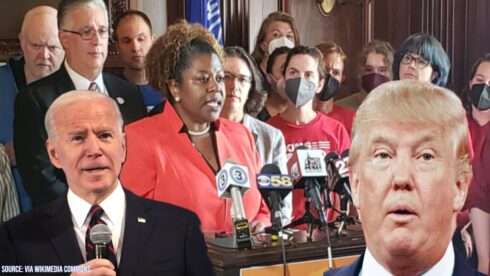Democratic lawmakers are intensifying their call for President Joe Biden to take decisive action on federal marijuana laws as the clock ticks toward January. Representatives Barbara Lee, Earl Blumenauer, and Ilhan Omar, joined by Senators Elizabeth Warren and Ron Wyden, have issued a letter to President Joe Biden and Vice President Kamala Harris urging them to reclassify marijuana from a Schedule I to a Schedule III controlled substance. This proposed shift would acknowledge marijuana’s medical benefits while reducing its classification from the most restrictive category, currently reserved for drugs deemed to have no medical use and a high potential for abuse.
Democratic lawmakers see this action as an essential step toward meaningful cannabis reform at the federal level. They argue it could cement Joe Biden’s legacy as a leader who addressed decades of inequity in marijuana policy. Moreover, with the potential return of former President Donald Trump, they stress the urgency of enacting reforms now, warning that progress made during Joe Biden’s term could be undone under a new administration. By taking bold steps, Biden could set a historic precedent while aligning federal laws with public opinion and state policies.
Reclassifying Marijuana: What It Means for Federal Policy
Shifting marijuana to Schedule III would align federal policy more closely with the growing number of states legalizing cannabis for recreational or medical use. A Schedule III classification acknowledges the drug’s medical value and places it alongside substances like anabolic steroids and ketamine, which are regulated but not banned outright.
However, Democratic lawmakers emphasize that this change alone is insufficient. Despite reclassification, federal criminalization would persist, leaving millions of Americans vulnerable to legal repercussions. The disparity between federal and state cannabis laws would remain unresolved, perpetuating confusion and legal challenges for users and businesses.
Broader Clemency and Sentencing Reform Urged
In their letter, the Democratic lawmakers also called for broader clemency measures, urging Biden to grant additional pardons and commutations for those convicted of cannabis-related offenses. They highlighted the need to reduce sentences and end federal incarceration for individuals impacted by outdated marijuana laws.
The letter encouraged Biden to partner with state governors, advocating for expanded clemency and decriminalization of low-level marijuana offenses at the state level. Such actions, they argued, would address the enduring harm caused by decades of harsh cannabis policies, particularly among marginalized communities.
Public Support Fuels Momentum for Reform
A majority of Americans now favor marijuana legalization, with support crossing political and generational lines. This widespread backing strengthens the Democratic lawmakers’ push for urgent reform, framing cannabis policy changes as both politically viable and socially necessary.
The lawmakers emphasized that failing to act risks alienating key voter blocs and missing an opportunity to bridge gaps between federal and state laws. They view comprehensive cannabis reform as a way to enhance social equity and restore trust in the justice system.
Biden’s Legacy at Stake
The Democratic lawmakers presented marijuana reform as a potential capstone for Joe Biden’s presidency, highlighting its significance as a defining policy achievement. Addressing the inconsistencies in cannabis laws would not only fulfill campaign promises but also leave a lasting impact on criminal justice and healthcare systems.
The urgency is amplified by the possibility of Donald Trump regaining power, which could stall or reverse progress. By acting now, Joe Biden could solidify his administration’s commitment to progressive reform and human rights, securing a historic milestone.
Challenges and the Road Ahead
Despite growing pressure, challenges remain in implementing federal marijuana reform. Legal complexities, opposition from conservative lawmakers, and bureaucratic hurdles could delay or dilute the impact of proposed changes. Advocates warn that failing to act decisively risks perpetuating harm and legal disparities.
Still, Democratic lawmakers remain hopeful, urging Joe Biden to seize this critical moment. With bipartisan public support and increasing state-level legalization, the pathway to meaningful reform appears achievable, provided the administration takes swift and bold action.














